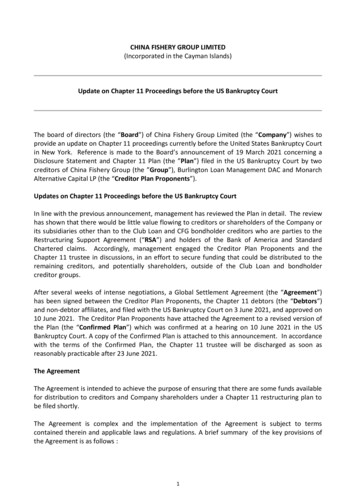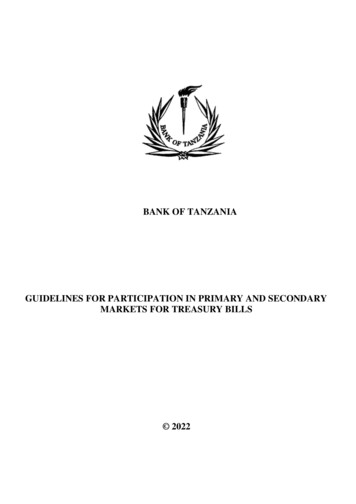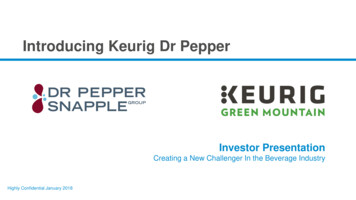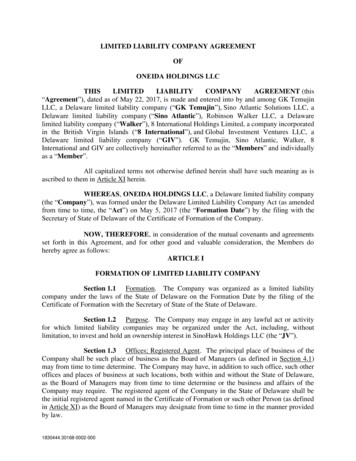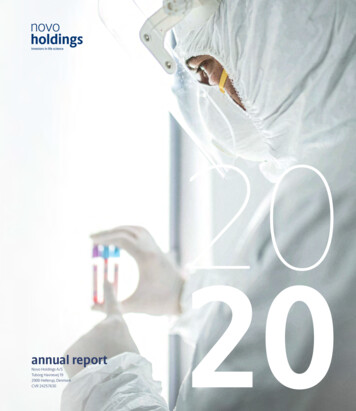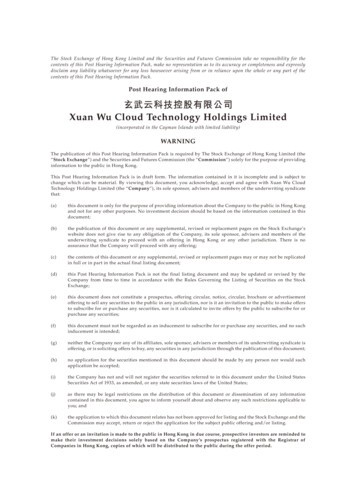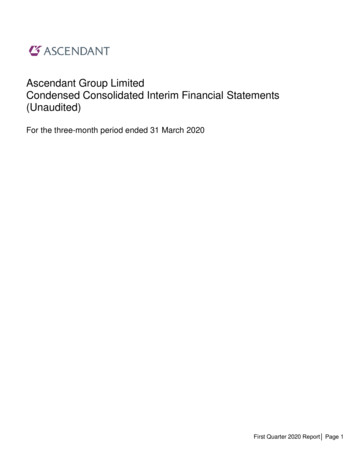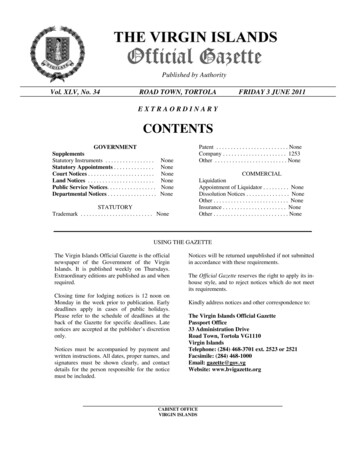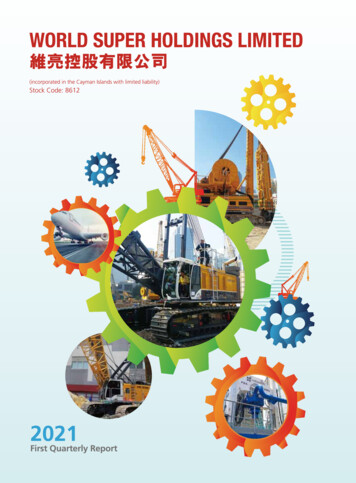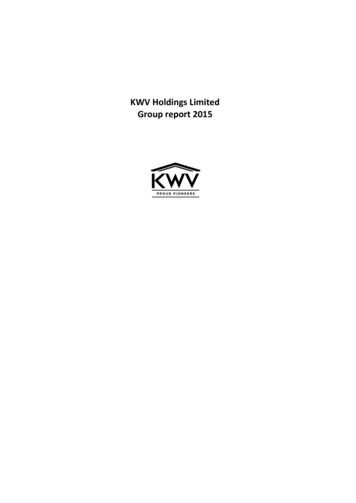
Transcription
KWV Holdings LimitedGroup report 2015
ContentsSalient features - group financial resultsBoard of directorsAnalysis of shareholdersChairman and Chief Executive Officer reportFinancial reportSustainability reportCorporate governanceContents of the financial statements2345-789 - 1213 - 1718
Salient features - group financial resultsfor the year ended 31 March 2015Audited2015R'000Audited2014R'000GROUP SUMMARYRevenue1 155 3851 110 21263 71546 27347 7721 3711 6071 7541 267 1121 225 154SharesIssued sharesUsed in the calculation of earnings per share68 00168 18868 53868 538PERFORMANCE PER ORDINARY SHARECentsCents67.870.11.42.61 8631 788651780Profit before income taxTotal comprehensive incomeHeadline earningsTotal equityAttributable earningsHeadline earningsNet asset valueShare price2KWV HOLDINGS LIMITED
Board of directorsNon-executiveMJA Golding (Chairman)JA CopelynF-A du PlessisNL EllisMN JoubertKI MampeuleKR MolokoLA van DykExecutiveA van der VeenDP SmitBoard committeesGroup Audit and risk management committeeF-A du Plessis (Chairman)KR MolokoJA CopelynHuman resources and remuneration committeeLA van Dyk (Chairman)MJA GoldingSocial and Ethics committeeMJA Golding (Chairman)JA CopelynKI MampeuleLA van Dyk3KWV HOLDINGS LIMITED
Analysis of shareholdersas at 31 March 2015Number ofshareholdersRANGE OF SHAREHOLDINGS0 - 1 0001 001 - 10 00010 001 - 50 00050 001 - 100 000100 001 - 1 000 000more than 1 000 000sharessharessharessharessharesshares1 683980221101362 913%57.833.67.60.30.40.3Number ofshares%642 1243 306 4144 112 785636 2434 521 60155 761 2070.94.86.00.96.680.810068 980 374100TYPE OF SHAREHOLDERSKWV Employee Empowerment TrustNiveus Investments Ltd11-3 020 34538 849 8914.456.3Total share of BEE shareholders2-41 870 23660.712 910100.0979 42726 130 7111.437.92 913100.068 980 374100.0KWV SA (Pty) LtdOtherTRADING STATISTICS2015Number of shares tradedPercentage of issued shares tradedValue of shares tradedNumber of transactionsMarket price per ordinary share- average- highest- lowest- closing20141 653 6752.40%R 12 814 5641831 817 5652.63%R 15 201 075295R 7.75R 8.50R 6.50R 6.51R 8.36R 9.26R 7.30R 7.80A register of shareholders is available at the registered office for the information of stakeholders.The trading statistics disclosed above only reflect shares traded through our brokers' trading system. (This therefore does notinclude direct transactions between shareholders that are registered directly with the share transfer secretaries.)4KWV HOLDINGS LIMITED
CHAIRMAN AND CHIEF EXECUTIVE OFFICER'S REPORTWe aim to build KWV into a global, diversified, alcoholic beverage business. During this year we made progresstowards this goal as we managed to increase our profit substantially from the prior year. We also increased ourmarket share in wine and brandy in South Africa and we were once again the only South African wine brand to berecognised on the Drinks International Top 50 Global Wine Brands survey.Our strategy is focused on volume growth in our premium brands. The infrastructure at KWV is designed for highvolume production, in particular for brandy, and the structure of our South African operations is geared to highvolume sales.The most significant asset reflected on our balance sheet is our spirits inventory, which mainly consists of brandyinventory under maturation. Of our total inventory, spirits comprise approximately R680 million, recorded athistorical cost. If we were to maintain our volume growth strategy we will be required to further invest in thisinventory in order to meet future demand. With the minimum brandy age in South Africa being three years we needto plan at least four years into the future, which is becoming exceedingly difficult in a declining category.The economic return we earn from our brandy investment is unfortunately very low given the current price point ofbrandy in South Africa. This is reflected in our share price, and the investment in brandy inventory does not generatean economic return that is attractive to shareholders.In South Africa, excise as a component of the retail selling price has increased substantially during the last number ofyears. Each bottle of brandy currently has R48 of excise duties embedded in its price. Consumer consumptionpatterns are influenced by the retail selling price and our ability to pass the excise increases on to the consumer hasbeen limited by certain key price thresholds. This has eroded margin.The fate of the brandy market is also largely influenced by the strategy of Distell, who controls approximately 70% ofthe South African market. While their stated intent has been to premiumise their brands, they have not changed theirapproach to the retail selling prices of their products at the lower end of the brandy market, where most of thevolume is sold. Brandy sales are highly price elastic and the effect of a price change is instantly seen as most of thebrandy sold in South Africa is sold through five retail groups.Last year we indicated that price competition in the brandy category is fierce and that we had made the decision notto hand the category to our competitors. We countered with our own pricing strategies and successfully increasedour market share to 13,8% of the category. Economically it is not a sound decision, but it is required if we are toremain relevant in the category and if we are to maintain our retail relationships.We believe that KWV is the most respected and premium brand in the brandy segment, but the ability to extract aprice premium for this is limited. The price points for brandy are largely determined by the dominant player in themarket and it would be foolish for us to significantly deviate from these prices while trying to maintain sales volumes.Our strategy is to find the right balance between brand profitability, the investment in inventory and our competitiveposition in the market. In our view prices in the cut-price segment are too low to be sustainable.While South African brandy standards are very high and strictly enforced, other markets, especially the high-volumemarkets such as India and Indonesia, have very limited regulatory requirements and the brandy sold there is mostlyinferior flavoured spirits. We cannot compete with these spirits due to their low price points and the potential taintrisk to our brand name. Consequently, our efforts to sell our brandy internationally have seen limited success.5KWV HOLDINGS LIMITED
CHAIRMAN AND CHIEF EXECUTIVE OFFICER'S REPORT (continued)South African brandy is directly comparable to cognac, with the only real difference being the country of origin of thebase wine used in the distillation of the product. The cognac brand has been built over many years and it will not beeasy for us to compete in this segment on our own. We are growing our international sales, but it may be many yearsbefore we see our brandies rightfully recognised with the same cachet as cognac.Our wine business does not have the same challenges as brandy and we are fortunate that we have seen good growthin wines sold under the KWV, Laborie and Roodeberg trademarks in South Africa. This growth is important as itsupports the fixed-cost investment we made in our own sales force and route to market capability. While we achieveda revenue growth of 21% in the South African market we are a long way from meeting our own profitability goals andit is unlikely that the scale benefits required to amortise our investment will be recouped with our current brandportfolio. In order to enlarge our footprint in the South African market, we need a bigger variety of products in ourbasket.Inventory risk is inherent in the wine industry as we need to procure well in advance of anticipated sales, taking intoaccount that we have a limited time to store wine before quality is affected. Operational improvements were made inour inventory management processes by incorporating early warning triggers that will result in less writeoffs infuture.One of the efforts to grow our basket in South Africa was the investment in our ready-to-drink (RTD) portfolio. Theresults to date are disappointing and we continually have to assess our marketing investment, margins and tradeactivation plans in this segment. We may be underinvesting in this portfolio as we have prioritised our marketinginvestment behind our KWV trademark. We recently acquired the Hooch trade name. The brand was one of the firstRTDs in the South African market and our research indicates a high level of brand recognition, albeit from consumerswho may have moved beyond the category. The brand is established and, given some focus and route to marketmanagement, may surprise us with its growth potential.The other reason to grow the RTD portfolio is its relatively low working capital requirements compared to the rest ofour portfolio. Our business remains constrained in terms of working capital and we will have to progressively considerthe working capital effect of our sales and marketing decisions. Long lead time investments in raw material and longmaturation requirements are not ideal in a world where margins are declining.The proposed government ban on alcohol advertising in South Africa has not been implemented and we still believethat the ban will not reduce consumption but merely entrench existing brands and make them even stronger. We willthus continue to invest in our brands.Our international wine sales are stable despite difficult market and economic conditions in most markets where wesell our products. Our wine does not only compete with other international wine brands but also competes as part ofthe South African wine category globally. The South African wine category is declining in many European markets, andwhere growth is taking place it is often at the lower price points. The export of bulk wine from South Africa is enablingmany international retailers to build their own brands. Competing against these in-house brands is very difficult in afragmented category. The exchange rate depreciation in the prior year has, however, assisted us in recoveringmargin. Our Roodeberg and KWV brands have a substantial and loyal following, which enables us to retain salesvolumes even as the South African category is declining.6KWV HOLDINGS LIMITED
CHAIRMAN AND CHIEF EXECUTIVE OFFICER'S REPORT (continued)We have continued with our plans to invest in our own resources and infrastructure in key international markets. OurUSA and Russian offices are operational and we have appointed inmarket resources in Europe and Africa to work withour agents. As indicated in our previous reports, it will take some time for our USA office to become profitable, butwe believe the investment to be worthwhile given the size of the market and the margin potential.KWV was the only South African wine brand recognised on the Drinks International List of the World’s most admiredwine brands where we achieved the 33rd ranking. We are proud of this achievement despite the trend in the wineworld to recognise the small boutique wine brands that are perceived to produce high-quality handcrafted wines. Wehave proved – through our success in numerous wine competitions – that our wine is as good, if not better, than thefashionable boutique offerings. Our success is the result of our access to exceptional grapes, our relationship with ourgrowers, the investment we have made in our winemaking team and our ability to constantly innovate and improveour cellar practices. We continued to invest in procuring better quality grapes than what the price point of the winerequires. This extra expense is seen as part of our marketing investment and we will continue with this approach aswe grow our volume in the premium wine segments.The benefit of a depreciating currency, which had a substantial impact on our profits in the past two years, wasreduced significantly during the last couple of months as the rand strengthened against key trading currencies. Giventhe current global climate, we will not be able to increase prices in our key export markets and, coupled withincreased costs in South Africa, this will inevitably lead to reduced margins in the future. The likelihood of substantialvolume growth both locally and internationally is limited, especially with the relatively large harvest in Europe. Ourindustry is likely to see increased bulk wine sales and the weakness in the Russian market and in UK retail will putfurther pressure on large wine producers to sell their wine at lower prices.Our loyal supplier base, international agents and staff have supported us in the year and we thank them for this. Wealso thank our board of directors for their support and guidance.André van der VeenChief Executive OfficerMarcel GoldingChairman7KWV HOLDINGS LIMITED
FINANCIAL REPORTRevenue grew by 4% to R1 155 million in the current year. This is unsatisfactory in the light of export sales thatbenefited from the rand being around 4,5% weaker and South Africa’s inflation of about the same magnitude. Winesales increased by 4,3%. We achieved solid volume and revenue growth in South Africa and our core brands,Roodeberg, KWV and Laborie, performed well. Unfortunately this was tempered by a decrease in export sales toEurope.Packed spirit sales grew by 2,5% compared to the prior year, but volumes declined. Even though strong volumegrowth could be seen in some of the core spirits brands such as KWV 3 and Bols brandy, this was mitigated by asignificant decrease in bulk spirits volumes. The fierce competition in the South African market remains a challenge aswhiskey continues to grow at the expense of the brandy category. Not only were volumes under pressure, but thesales mix deteriorated and profit margins were squeezed due to pricing pressure and consumers trading down.KWV’s RTD portfolio faces many of the same challenges as spirits, as it is also focused on the South African market.Sales volumes declined, resulting in a 2% decrease in revenue. Aggressive pricing on the Ciao brand resulted in a 17%volume growth, but decreased margins in this category. Contract bottling volumes were considerably less than in theprior year, but revenue and margins improved significantly due to more profitable contracts concluded during theyear. This resulted in a significantly improved contribution to operating profits from this category.From a regional perspective, South African revenue increased by 9,7%, mainly driven by double-digit growth in bothpacked wines and packed spirits.Packed exports to Europe declined by 1%, reflecting the poor economic growth and the pressure on the South Africancategory. Margins also reduced as a result of a weakening euro, pressure to reduce prices and a change in sales mix.Export sales to Africa, somewhat assisted by the strong US dollar, showed moderate growth of 8,5%, which wassignificantly less than what we aimed for. Sales in Asia and the Americas were, however, disappointing and reducedby 9,4% from the prior year.The significant decrease in the South African trading profit is largely the result of pressure on the brandy category asdetailed above. In addition, advertising and promotion costs increased due to a televised trademark campaign, thefirst in many years, aimed at building the KWV brand.The trading profit of our sales in Europe also decreased. First as a result of the volume and margin pressure, but alsobecause some of the main markets in which KWV competes require fixed investments into marketing and salessupport, which further impact profitability.The group’s gross profit margin decreased from 31,5% in the prior period to 30,4%. The main contributors werepricing pressure on wine exports to Europe and brandy sales in South Africa, and a steady increase in costs of goodssold.Other gains and losses contain significant exchange rate profits of R31,2 million compared to a loss of R48,2 million inthe prior year. Both the prior year losses (when the rand weakened significantly) and the current year gains (when therand continued to strengthen throughout the year – particularly against the euro) is as a result of our strategy tohedge a significant portion of our expected exports in advance of a financial year.Operating expenses were contained to 28,3% of revenue, exactly as in the prior year. Sales, marketing anddistribution expenses increased, especially in the South African market and Europe, while operational andadministrative expenses were well contained and decreased by 6,8% from that of the prior year.The net effect is that the group made an operating profit of R62,3 million compared to a loss of R2,2 million in theprior year and generated headline earnings of R47,8 million compared to R1,7 million in the prior period.The current operating profit will not be sustained into 2016 as the significant exchange rate profit is unlikely to repeatitself. In addition, continued margin pressure is expected from the brandy market in South Africa, as well as the winecategory in Europe.With regard to the group’s financial position, the total assets and liabilities are stable. The most noticeable change isthe decrease in cash resources and lower payables. The main reason for this was that South Africa’s 2015 harvestseason was about one month earlier and KWV made significantly higher payments to producers in March, just beforeyear-end, instead of in April.KWV’s net asset value improved from R17,88 to R18,63 per share.8KWV HOLDINGS LIMITED
SUSTAINABILITYKWV strives to be a responsible, contributing corporate citizen through the implementation of its sustainabilitystrategy. KWV is committed to the empowerment, development and upliftment of disadvantaged communitiesprimarily in geographical areas where the business operates. The group's sustainability strategy is aligned to theMillennium Development Goals, the King III Report and the company’s overall mission and vision.The objectives of KWV’s sustainability policy are to:- create a positive, sustainable impact on communities through investment in order to improve the quality of lifeand welfare of disadvantaged people;- build and improve relationships with the group's existing and potential stakeholders;- advocate and promote the responsible use of its products and other alcoholic beverages within the self-regulatoryenvironment in which KWV operates.COMMUNITY DEVELOPMENT AND SOCIAL UPLIFTMENTOur social sustainability strategy is implemented through enterprise development and socio-economic development.Enterprise developmentThe Clothing BankThe Clothing Bank is considered a best practice example of sustainable enterprise development. Through thisentrepreneurial initiative, over 637 women have been assisted to start small retail businesses. The Clothing Bank’sholistic programme focuses on the training and development of unemployed mothers to assist in their transformationfrom demotivated brokenness, low self-esteem and dependence on handouts to empowered, confident andfinancially independent women.Coaching plays a fundamental role in the upliftment and emotional empowerment of the participating women. Lifecoaches continue to meet with participants during the two-year training period. Participants start running a smallbusiness within weeks of joining the programme, with the objective of earning sufficient income to provide for theirfamily’s basic needs. When participants exit the training programme they are supported to find alternative microfranchise business solutions and they are mentored to migrate from their small retail business to new “business in abox” opportunities. KWV sponsored eight women to participate in this initiative during the 2015 financial year.Socio-economic developmentMasikhule Childcare (Masikhule)Masikhule’s training programme is focused on early childhood development (ECD) for staff at rural and township ECDcentres. Implementation of a sound ECD programme requires centres to have access to basic resources such aseducational materials and stationery. Masikhule’s mission is to ensure that infants and young children fromdisadvantaged communities receive valuable and appropriate stimulation that is vital for holistic development andfuture learning. They offer accessible, community-based training in ECD skills to crèche and community workers.Masikhule aims to enrich the lives of unemployed women in these communities by providing training in childcareskills and placing them in suitable jobs as child minders. The KWV Foundation Trust (The Trust) sponsored R40 000towards the programme for in-house training and mentoring at three Klapmuts crèches and R27 500 towards theBusiness Management Course that was attended by créche managers.The Pebbles projectThe purpose of the Pebbles project is to enrich the lives of children with special educational needs fromdisadvantaged backgrounds. They provide support and training to local wine farms and township crèches andestablish after-school supervision for older children living in the Winelands. The Trust sponsored R30 000 towards thePebbles School Leavers Programme. The aim of this project is to provide learners not only with sufficient informationto make responsible and informed career decisions but also with the means to further their studies upon graduation,should they choose to do so.9KWV HOLDINGS LIMITED
SUSTAINABILITY (continued)The Klapmuts Community CentreThe aim of supporting this community centre is to create an environment in which disadvantaged and challengedchildren and mothers can be stimulated and taught. The Trust is working in partnership with a social worker who isresponsible for counselling sessions and running of a soup kitchen.The Trust is also able to run other social upliftment projects from this property. Examples include the making of artsand crafts from recycled materials like wine corks and fabric that are sold to the public through KWV. Decorativecushions, blankets and soft toys are also created in the sewing and knitting project. The Trust sponsored a canopy forthe soup kitchen and hosted a Christmas party for 50 children from Klapmuts at the community centre.AIKIDO SOUTH AFRICA (ASA)AIKIDO SOUTH AFRICA was established to teach aikido, a traditional Japanese martial art, to children, youths andadults across the spectrum. ASA currently provides training programmes to disadvantaged children from the mostimpoverished communities in the Boland, including Mbekweni, Klapmuts and Paarl. The Trust has partnered with ASAby providing a facility where ASA training programmes can take place.Pinotage Youth Development Academy (PYDA)PYDA develops young talent for employment in the wine industry and related sectors. It is intended that the academywill transform the lives of the students and their communities, as well as contribute to broader transformationefforts. Its high-quality youth development programme dovetails with the government’s education initiatives, such asthe provision of further education and training to those unable to access a university education. The Trust haspartnered with them on this journey by sponsoring one Paarl-based individual to attend the academy as well asassisting with work placements and practical support from specialist employees. KWV employed one of the studentsafter graduating.Khula Development GroupFieldworkers are trained and empowered to reintegrate children back into the school system after having droppedout. The school sends the fieldworkers to children’s homes to determine what caused the children to stop attendingschool and aims to return the children to school. With support from the Khula Group, the fieldworkers remain incontact and monitor the children to ensure continued school attendance. The Trust has sponsored R60 000 toimplement this system at Klapmuts Primary School.Discover & Share tennis projectThe aim of the project is to improve the overall well-being of children and the youth in the Paarl/Wellington area bypromoting purposeful tennis coaching in cooperation with local partners in the schools. The children and young adultsare motivated to share their positive attitude towards exercise and sport with their friends and family members. KWVis providing access to the tennis courts on their premises to the Discover & Share team where tennis lesson take placeduring the week. The Trust also funded the printing of pamphlets for marketing of the project at schools in Paarl.The KWV Foundation Trust supports, among others, the following organisations:- Boland School for Autism - www.bolandautism.org.za- The Institute for the Blind - www.blind-institute.org.za- Klapmuts Primary School- Drakenstein Hospice www.drakensteinhospice.org.za- Ligstraal School for Learners with Special Educational Needs - www.ligstraalschool.com- Valcare Trust - www.valcare.org.za10KWV HOLDINGS LIMITED
SUSTAINABILITY (continued)Responsible use of alcoholKWV, as a founding member of the Industry Association for Responsible Alcohol Use (ARA), is committed tosupporting ARA in its objectives to reduce alcohol-related harm through combating the abuse of alcoholic beverages.ARA is one of the main funders of the Foundation for Alcohol Related Research, which does extensive research in thearea of fetal alcohol syndrome and fetal alcohol spectrum disorders.KWV subscribes to the ARA Code of Commercial Communication and is committed to complying with the Code insupport of the self-regulatory environment in which its business operates.ENVIRONMENTKWV’s commitment to the environment is reflected in its environmental policy and the Integrated ManagementSystem (IMS). Practices and procedures relating to the purchase of raw materials as well as production and packagingoperations are evaluated to ensure minimal detrimental effect on the environment.The IMS also places an emphasis on product quality, food safety, employee health and safety, waste management aswell as sustainable practices.KWV and all its suppliers of grapes and wine products are accredited members of the Integrated Production of Wine(IPW) scheme. The IPW is considered to be the world’s most extensive and strictest sustainability programme of itstype. In addition to extensive requirements relating to good agricultural best practices, the IPW also containsguidelines dedicated to the conservation of the biodiversity in the Winelands.KWV has a continuous focus on the sustainable principles of the IPW scheme and has invested time with suppliers ofraw material to help them to understand and apply the principles.Under supervision of the manager for sustainability, the environmental sustainability programme is implemented byour environmental champions, whose roles are to evaluate, measure and monitor the environmental aspects andimpacts in their various areas of responsibility.KWV participated in the annual HCI Carbon Disclosure Project.BiodiversityThe Laborie Estate is a member of the Biodiversity Wine Initiative (BWI). KWV successfully passed both IPW and BWIaudits. Farming activities at Laborie are conducted in an environmentally sustainable manner. Areas have been setaside for preservation of endemic plant species such as Spekboom and continual cleaning of alien vegetation arebeing performed.Water and energy managementReal-time monitoring devices were installed on the respective electricity and water distribution networks at the KWVproduction site in Paarl and are now being used to establish a consumption baseline for these resources.The consumption of energy and process services, for example water and electricity, are actively monitored perdepartment and managed through the environmental sustainability programme.Further energy management initiatives include the following:- The lighting energy audit was updated and consolidated to include a life cycle cost analysis.- KWV is continuously investigating and implementing techniques and technologies to improve operationalefficiencies and, in the process, reducing the impact of its carbon footprint and fossil fuel consumption.- Further investigation into energy saving will be done with respect to solar energy, behaviour change, replacementof out-dated high-energy consumption lights and biomass technologies.11KWV HOLDINGS LIMITED
SUSTAINABILITY (continued)Waste management and recyclingBy actively managing and monitoring waste KWV, in collaboration with recycling partners, reduced solid waste from520 to 476 tons. Due to the success achieved through this initiative, liquid waste has also been added to the KWVrecycling programme.In terms of the National Environmental Management Waste Act, the KWV production site in Paarl is registered on theSouth African Integrated Polution and Waste Information System (iPWIS).Effluent treatmentPaarlAs prescribed by the Drakenstein Municipal Industrial Effluent By-law No 18/2007, KWV has applied for and obtainedan Industrial Effluent Disposal permit valid for a period of five years. Alternative methods of treating the industrialeffluent are being investigated and a project has been initiated to improve the quality of our effluent water.UpingtonIn terms of the new National Environmental Management: Waste Act, a legal process has been completed and anapplication for a waste licence has been submitted to the Department of Environmental Affairs and Planning. As partof determining alternative effluent treatment methods, trials for a wetland pilot plant are currently under way.WorcesterThe Solamoyo Processing Company, a partnership between KWV, Distell and Brenn-O-Kem, has implemented aneffluent disposal project. The management of the site is governed by the Management Services Agreement betweenSolamoyo Processing Company and the Breede Valley Municipal Council.Environmental initiativesAt our Worcester distillery, KWV has implemented the following initiatives to reduce coal use:- Lagging of column stills to save on energy cost by reducing heat loss- Installation of variable speed drives on cooling tower motors to save electricity by not running the motor at 100%capacity on a co
USA and Russian offices are operational and we have appointed inmarket resources in Europe and Africa to work with our agents. As indicated in our previous reports, it will take some time for our USA office to become profitable, but we believe the investment to be worthwhile given the size of the market and the margin potential. KWV HOLDINGS .
